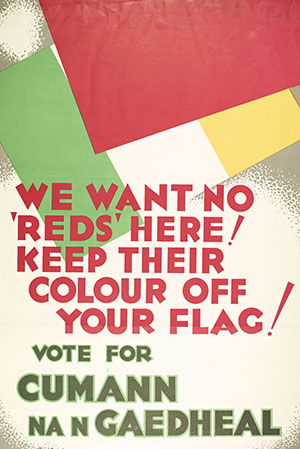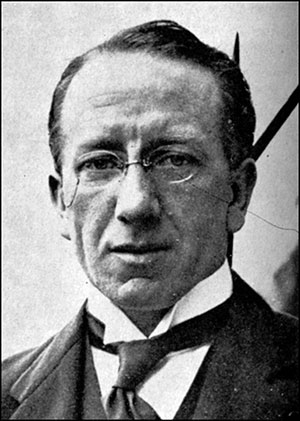ON THIS DAY
Published in Issue 2 (March/April 2017), News, Volume 25MARCH
09/1932

Above: ‘No “Reds” here’—a 1932 anti-Fianna Fáil Cumann na nGaedheal election poster.
03/1977
Brian Faulkner (56), last prime minister of Northern Ireland (March 1971–March 1972), was killed in a hunting accident, two days after his reception into the House of Lords.
04/1867
The Fenian Rising took place, with outbreaks in several counties, notably Tallaght, Co. Dublin, and ended in failure.
06/1987
The Herald of Free Enterprise, a roll-on-roll-off ferry, capsized moments after leaving the Belgian port of Zeebrugge, killing 193 passengers and crew.
07/1967
Minister of Home Affairs William Craig banned commemorations in Northern Ireland to mark the centenary of the Fenian Rising. He also banned Republican Clubs, which he described as a front for the IRA.
08/1917
The February Revolution in Russia led to the establishment of a provisional government and the demise of the Romanov dynasty.
Ferdinand von Zeppelin, German general who founded the Zeppelin Airship Company, died.
12/1917
In Russia the Petrograd soviet (workers’ council) was founded, followed by numerous others throughout the country, competing for power with the new provisional government.
12/1947
In a speech to Congress, President Harry S. Truman enunciated what became known as the ‘Truman Doctrine’—US support for nations threatened by Soviet expansionism.
15/1767
Andrew Jackson, seventh president of the United States (1829–1837), born in the Scots-Irish community of Waxhaws district, South Carolina, two years after his family arrived from Ireland.
15/1917
Czar Nicholas abdicated.
16/1967
Thomas MacGreevy (74), scholar, poet, critic and director of the National Gallery of Ireland (1950–64), died.
18/1967
The SS Torrey Canyon, bound for Milford Haven with a full cargo of crude oil, struck rocks off the Cornish coast, leading to a major environmental disaster.
25/1957
The Treaty of Rome established the European Economic Community (EEC).
28/1957
Jack Butler Yeats (85), painter and younger brother of W.B. Yeats, died.
31/2012
Mike Nesbitt (54) was elected leader of the Ulster Unionist Party.
APRIL
06/1959

Above: Seán T. O’Kelly, the first president of Ireland to be officially welcomed on British soil
01/1917
Scott Joplin (49), African-American composer and pianist known as the ‘King of Ragtime’, died in a mental institution.
02/1917
President Woodrow Wilson delivered a war address to Congress. Four days later the US declared war on Germany.
09/1947
Desmond Fitzgerald, journalist and Cumann na nGaedheal politician who was minister for external affairs (1922–7), died. He was the father of Dr Garret Fitzgerald (1926–2011).
09/1992
In the Westminster election the Conservatives, under John Major, were returned to power. Joe Hendron (SDLP) ousted Gerry Adams (SF) in West Belfast.
10/1867
George William Russell, widely known as ‘AE’, poet, mystic, editor, writer and artist, born in Lurgan, Co. Armagh.
16/1917
After twelve years in exile, the leading Russian Bolshevik, Vladimir Illyich Lenin (47), arrived in St Petersburg after a week-long journey from Zurich in a sealed train.
16/1947
The expression ‘Cold War’, a war waged through proxies, was coined by the US statesman and millionaire financier Bernard Baruch.
17/1917
Jane Barlow (60), writer, whose Irish idylls went into eight editions, died.
22/1967
Walter Mackin (50), actor, dramatist and novelist, best remembered for his historical trilogy Seek the fair land (1959), The silent people (1962) and The scorching wind (1964), died.
25/1917
Ella Fitzgerald, jazz singer, born in Newport News, Virginia.
25/1987
Lord Justice Gibson and his wife were killed by an IRA bomb as they crossed the border south of Newry, Co. Down.
26/1937
During the Spanish Civil War, the Basque town of Guernica, a bastion of Republican resistance, was pounded by the German Condor Legion with high-explosive bombs and at least 3,000 incendiary bombs. Over 1,600 people were killed in the subsequent firestorm.
29/1917
Following the disaster of the second Battle of the Aisne that month, almost half of the French infantry divisions on the Western Front mutinied.
















